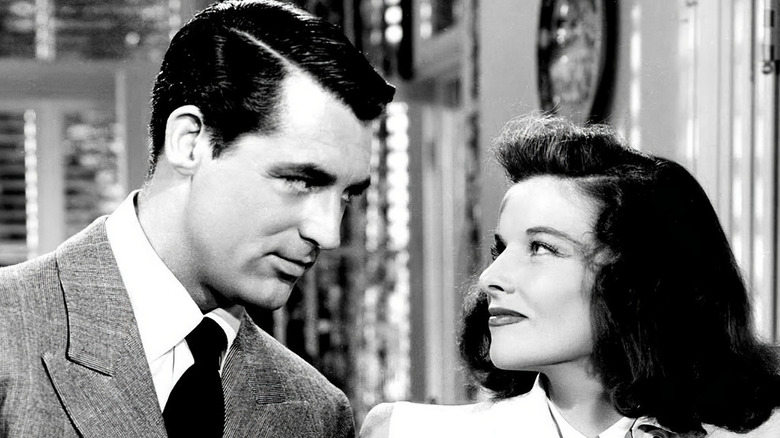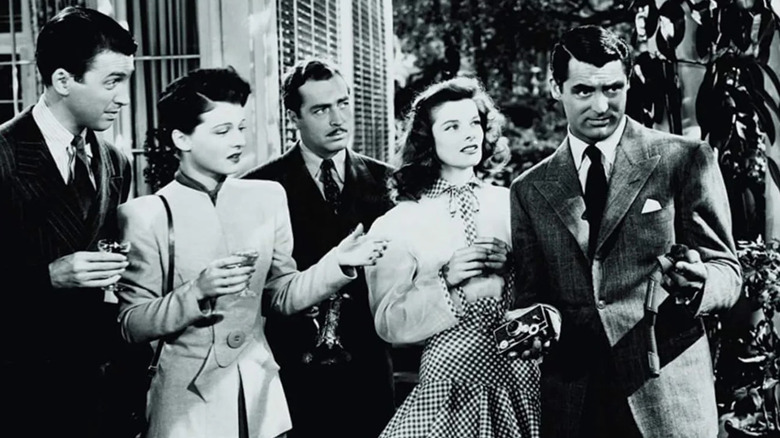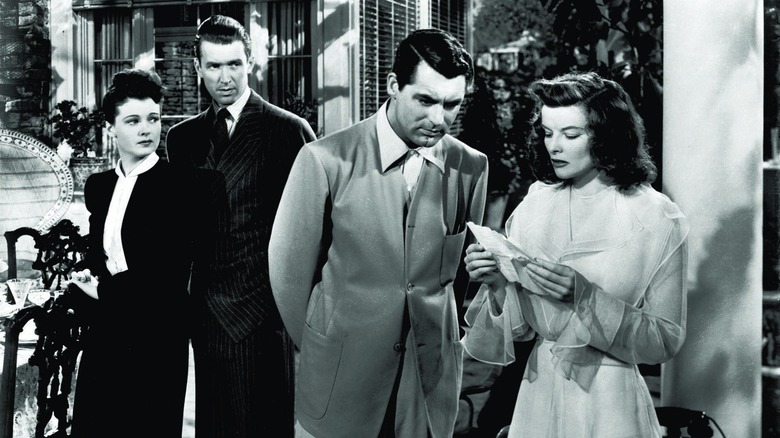Two Demands Had To Be Met To Get Cary Grant In The Philadelphia Story
In Hollywood, movie stars can often bend reality to their will. Producers are desperate to get the right actor on the screen, and are basically willing to part the seas in order to get them on board. This often gives these movie stars great leverage with which to negotiate. They're in high demand, and, with there only being one of them, in extremely short supply.
When Katharine Hepburn saw the script for "The Philadelphia Story," she had been losing this leverage at a rapid pace. After finding great success with films like "Morning Glory" and "Little Women" in the early '30s, Hepburn had been on a harsh cold streak. Her rebellious attitude and lack of success at the box office led to her being labeled "box office poison" by 1938.
But seeing the potential in "The Philadelphia Story," Hepburn knew she needed to make it happen. She purchased the motion picture rights to the property and went to MGM studio head Louis B. Mayer, making him a deal; she'd sell him the rights to the movie for cheap, if she could star and choose the director and cast. Despite her "poisonous" status, the deal was made, and Hepburn used what little leverage she had to get herself into a powerful position.
While she succeeded in that negotiation, it was the negotiation to get the legendary Cary Grant to co-star with her that would be more troublesome. Grant wouldn't be in the movie for just anything. He had demands of his own.
Meeting Grant's demands
Cary Grant, one of the industry's fastest rising stars, had about as much leverage in negotiations as any actor in Hollywood at the time. If Hepburn was box office poison, Grant could have been the antidote.
But Grant knew this. Why would he, the biggest name in town, want to be in a movie with Hepburn? Sure, the script was good, but there are lots of great scripts out there. Grant knew what he was worth. He had a persona and an aura about him, one that film greats like Alfred Hitchcock knew could anchor movies in a way few other actors could.
So Grant made some demands of Hepburn (via TCM). He'd be willing to work with her, on two conditions. First of all, he would need to receive top billing. This was likely the easier part of the proposition, as even Hepburn knew her name wasn't exactly carrying much water in Hollywood at the time. Grant's name being atop all of the film's posters would only be good for the financial success of the picture.
The second request was that Grant be paid $137,000 for the film, an extremely generous salary. This was likely made more possible by the cheap price Hepburn had sold the rights to the picture to the studio for, opening up some room in the budget to splurge for Grant.
With his demands met, Grant joined the movie, and success followed.
The antidote
"The Philadelphia Story" was a great box office success. It was also a hit with critics and was nominated for six academy awards, winning two (including Best Picture).
The movie was a point of revival for Hepburn's career. She had thrown aside her label as box office poison, and was back to starring in successful movies. With hits like "The African Queen," "Long Day's Journey Into Night," and "Guess Who's Coming To Dinner," her illustrious career would span four more decades.
As far as Grant goes, his career would also just continue to skyrocket, with such films as "North by Northwest," "To Catch a Thief," and "Charade" in his future. Interestingly, he would donate his entire generous salary from "The Philadelphia Story" to the British War Relief Fund.
For the rest of her life, Hepburn would be happy she bet on herself with "The Philadelphia Story." "Without 'The Philadelphia Story' and Phil and Howard, my life would have been very different," Hepburn said in her personal biography. "It would have gone on, but maybe my career wouldn't have."
Hepburn's career did go on, into the realm of film legend. Katharine Hepburn went from box office poison to a titan of the silver screen.


